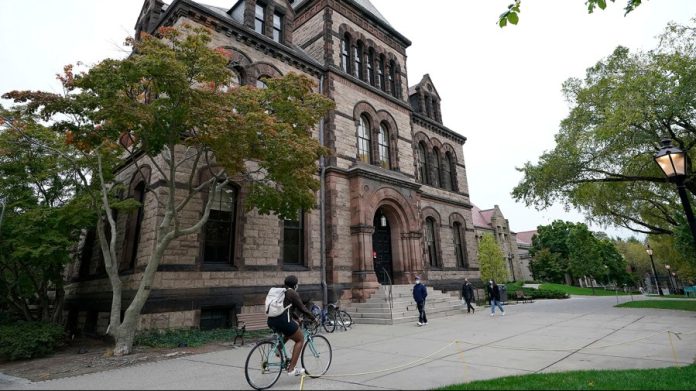
Three universities touted restoration of federal funding as the crux for striking deals with the Trump administration, but it’s unclear to faculty and onlookers whether all the benefits have panned out for these institutions.
While leadership at the University of Pennsylvania, Brown and Columbia, along with the Trump administration, have said funding was restored, some researchers still see their money cut and others have received no communication from administrators when asked about the details of restored funds.
The fallout is a warning sign to other campuses looking to make deals with the administration, such as Harvard and the University of California.
Michael Thaddeus, professor of mathematics at Columbia and vice president of the Columbia chapter of the American Association of University Professors, said his institution has become more secretive in recent years and university leadership has not given details to the restoration of money at the school.
“My main thought is that it’s very hard to find out what’s going on, even for insiders, even for Columbia faculty, it’s very opaque,” he said.
Federal money for academic research is a complicated process, making it difficult to fully understand how the money has been processed.
“The funding agency, such as the National Institutes of Health, awards the grant. Then the General Services Administration disperses the money to the central administration of a university like Columbia. The central administration tells lab administrators or departmental administrators that the money is there, and then the principal investigators charge submit reimbursement requests to them. So, it’s really never clear with each with any given grant whether that pipeline was ever blocked or how it’s been unblocked,” Thaddeus said, adding the university covered some funding for certain projects during the federal pause.
Some research projects are scrambling to hire back individuals that were fired during the funding pause while other projects related to topics such as transgender health have still not seen funding restored, according to The New York Times.
The settlements the three universities entered with the Trump administration were similar in some stipulations such as changing policies around disciplinary and protest rules.
In terms of amounts, the University of Pennsylvania did not have to pay a monetary sum to restore $175 million in funding, Columbia gave the Trump administration $225 million to restore $400 million in funding and Brown is paying $50 million to workplace development programs to get $500 million back.
In a statement from Brown, the university noted it did not receive payments from the National Institutes of Health from April to July, which made up 70 percent of its research funding.
“As of the end of July, the unreimbursed funds totaled more than $50 million, and this amount had been increasing by approximately $3.5 million per week. This was in addition to the outright termination of eight federal contracts and more than 30 federal grants,” Brown said.
However, not all grants were restored to the university.
“Of the eight federal contracts and more than 30 federal grants that had been terminated before the July 30 agreement, a portion of these were from federal agencies not under the purview of the U.S. Department of Health and Human Services and were therefore not reinstated per the terms of the agreement,” a spokesperson said.
Jon Fansmith, senior vice president for government relations and national engagement at the American Council of Education, said schools who took the deals did get the advantage of having a clear path before the beginning of the new academic year in terms of what resources would be available for classrooms and staffing.
“Having that hanging over your head, having the lack of federal funding that, again, was legally obligated to schools, having that restored, it really does make a huge difference for those campuses. And then there’s certainly all of the other kind of harder to quantify benefits of you’re not in the news cycle so much anymore, you’re not dealing with a hostile federal government, you’re not having to spend huge amounts of staff, time and money and legal fees and everything else to work through these situations,” he added.
A Columbia spokesperson pointed to a public FAQ sheet that said the “potential impact on Columbia was billions of dollars in current and future grants, and a fast-approaching loss of talent, and our research excellence” due to the funding pause.
The University of Pennsylvania did not immediately respond to The Hill’s request for comment.
The universities were hit hard by critics for the deals they made to get the funding back but have largely stayed mum on the situation.
According to Rick Hess, senior fellow and the director of education policy studies at the American Enterprise Institute (AEI), one of the reasons schools are staying quiet is “it’s hard to brag about” making a deal with a political party universities have labeled as “full of bad people.”
Hess also notes schools may be nervous the administration could swing back around as the deals did not include any guarantees the president would not go after the universities again in the future.
Every university is watching the fallout of these deals, including the University of California and Harvard, which are currently working on deals with the administration.
“I think they’re ready to move on from this, but they’re unable to because of the ripple effect that this is creating,” said Lynn Pasquerella, president of the American Association of Colleges and Universities. “So these deals came with significant policy concessions that compromise academic freedom, institutional autonomy and shared governance.”
“The aggressive use of funding as a leverage coupled with demands for settlements, and these demands for settlements are reshaping the relationship between universities and the federal government, and the concern is that these settlements will serve as coercive templates that could pressure dozens of other colleges and universities into accepting restrictive conditions for federal funding, and it really is a new model that threatens the core principles of academic freedom, institutional autonomy and due process,” she added.

